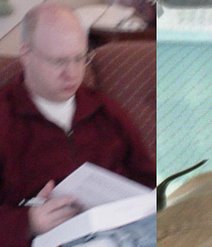So I have this dilemma. I believe I have a call to be a vocational theologian, but I have trouble recognizing theology as knowledge – at least anything more than natural theology. It’s like playing FreeCell when you get stuck, so you keep looking and looking at the board trying to figure out how to get that last ace free – then suddenly you find a way to move the cards you need to move, and suddenly half the deck’s gone. I keep struggling to find a defense of Christian theology that I think is epistemically sound.
Last semester I approached my theology professor, Kevin Vanhoozer, for an answer. “I don’t believe theology is really knowledge,” I quipped. He offered to share with me the epistemology he had developed that he felt provided a satisfactory answer. Unfortunately we ran out of time, and he invited me back a different time. I tried to meet again but missed our appointment because of traffic delays. It hasn’t worked for me to reschedule this semester, so instead I went to his article “The Trials of Truth: Mission, Martyrdom, and the Epistemology of the Cross” in To Stake a Claim (1999). I was very hopeful, but I finished the article disappointed.
Vanhoozer believes the task of the theologian is to stake the truth-claim that “God was in Christ reconciling the world to himself.” He believes that a proper epistemology must be concerned with wisdom in addition to knowledge. If epistemology is concerned with how we know the things we claim to know, then I take it he means that we should also be concerned with how we know how to apply what we know. He goes on to say that proper epistemological task is hermeneutical: to interpret the ‘text’ of reality. Following Kierkegaard he allows that the proper starting place may rightly be labeled hermeneutical fideism – we must accept the authority of the scriptures in order to understand. He cites Kierkegaard approvingly that if this were not the case, if we could make a philosophical case for the authority of scripture, then “God and the Apostle have to wait at the gate, or in the porter’s lodge, till the learned upstairs have settled the matter.”
It is exactly here that I have always strongly disagreed with Kierkegaard, and therefore with Vanhoozer. This approach would maybe work if the only other options on the table were atheism or agnosticism. (He is primarily arguing against Van Harvey, a modernist; Nietzsche, a post-modernist; and Socrates, a rationalist.) But the Christian missionary mandate forces us into dialogue with Islam, Buddhism, Judaism, Hinduism, or neo-Paganism. If Koranic-fideism were to produce a similar wisdom, then would that not similarly count as evidence for the veridicality of Islam? In fact, John Hick makes essentially the same argument in defense of Normative Religious Pluralism: all the major world religions produce an equal proportion of ‘saints,’ (we could call them ‘people of wisdom’), and therefore they are all equally valid religious traditions.
But Vanhoozer argues that his system can resist collapsing into normative pluralism. He notes the need for an ethical dimension in epistemology: those who interpret reality must have epistemic virtues like passion for truth, humility, and courage to stand for one’s convictions; they must likewise avoid epistemic vices, like intellectual pride or ignoring inconvenient evidence. He notes that the wrong actions can refute a truth-claim more effectively than an opponent’s counter-argument. Through a play-on-words where the Greek root of martyr means witness, He argues that the Christian truth claim is best defended when Christians witness to the truth of their faith and are consequently persecuted for it, perhaps leading to martyrdom. Martyrdom confirms the veridicality of the doctrines of Christianity but not of Socrates or fanatics, he contends, because Socrates offered no answers, only questions; and fanatics have only a desire for truth, but lack other epistemic virtues like humility.
But again, this is not a compelling defense for the particularity of the Christian faith. Christians are not the only ones who possess these virtues. Even if it can be shown that Christians have a greater proportion of ‘true’ martyrs than other religious traditions, why this is anything more than an arbitrary standard remains a mystery. But even more disturbing is the counter-argument that follows: if epistemic vices count as evidence against one’s truth-claim, then there is significantly more evidence against Christian truth-claims than there is for it.
Saturday, April 28, 2007
Subscribe to:
Post Comments (Atom)


2 comments:
All qoutes below from (“https://store.ligonier.org/product.asp?idDept=A&idCategory=PH&idProduct=HAN01AC)
It stands to reason: it is not reasonable to avoid reason.” – John H. Gerstner
“Christianity is a rational religion. If it’s not rational, it’s not Christian.” – John Wesley
With respect to John 17:3 (http://www.gnpcb.org/esv/search/?q=john+17%3A3&src=esv.org):
“That knowledge is at least rational knowledge.” – Francis Schaefer
Hi nice rreading your blog
Post a Comment